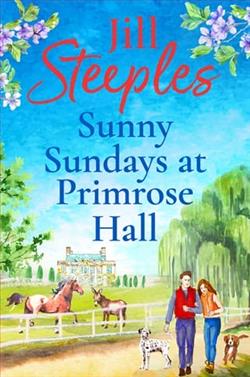Martial Peak Reviews
Jill Steeples' Sunny Sundays at Primrose Hall is a delightful exploration of community, resilience, and the unexpected paths that life often takes us on. Set against the picturesque backdrop of Primrose Hall, the novel weaves together the lives of its characters with warmth and a touch of whimsy, making it a perfect read for those who enjoy heartwarming tales of personal growth and community spirit.
The story centers around Primrose Hall, a place that is not just a home to Jackson Moody and his fiancée Pia, but also a vibrant hub for the local community. The Sunday craft fairs held in the renovated stables are a testament to the hall's role as a community cornerstone, drawing both locals and tourists with their charm and the promise of irresistible goodies. This setting provides a rich tapestry for the narrative, allowing Steeples to explore themes of belonging and the importance of community support.
At the heart of the novel is Sophie Wright, a character who embodies resilience and the courage to start anew. Having left behind a turbulent relationship, Sophie arrives at Primrose Hall with the hope of forging a new life and business. Her journey is one of self-discovery and empowerment, as she navigates the challenges of her past while building a future on her own terms. Steeples crafts Sophie’s character with depth and authenticity, making her relatable to anyone who has ever had to rebuild their life from scratch.
Contrasting Sophie’s journey is that of Tom, the newly-discovered older brother of Jackson Moody. Tom's integration into the Primrose Hall community is seamless, and his willingness to contribute wherever needed highlights his genuine nature. His character adds a layer of complexity to the narrative, especially when tragedy strikes and he finds himself in a position to support Pia. Tom’s development throughout the story is subtle yet impactful, as he learns to navigate his own emotions and the responsibilities that come with being part of a family.
The relationship between Sophie and Tom is a central element of the novel, and Steeples handles it with a delicate touch. Both characters are wary of romance for different reasons, yet their interactions are filled with a natural chemistry that is hard to ignore. The evolution of their relationship is gradual and believable, allowing readers to become invested in their journey. Steeples avoids the clichés often found in romantic fiction, instead opting for a more nuanced portrayal of how love can blossom in the most unexpected circumstances.
One of the standout aspects of Sunny Sundays at Primrose Hall is its exploration of community and the role it plays in personal healing and growth. The craft fairs are more than just a setting; they symbolize the coming together of individuals to support one another, share experiences, and create something beautiful. This theme is reminiscent of works by authors like Debbie Macomber and Jenny Colgan, who also excel in crafting stories that celebrate the power of community.
Steeples’ writing style is engaging and evocative, painting vivid pictures of the idyllic surroundings of Primrose Woods and the bustling activity of the craft fairs. Her attention to detail brings the setting to life, making it easy for readers to immerse themselves in the world she has created. The pacing of the novel is well-balanced, with moments of introspection interspersed with lively interactions and events that keep the narrative moving forward.
Overall, Sunny Sundays at Primrose Hall is a heartwarming and uplifting read that will resonate with anyone who has ever sought a fresh start or found solace in a supportive community. Jill Steeples has crafted a story that is both entertaining and thought-provoking, with characters that linger in the mind long after the final page has been turned. Whether you are a fan of contemporary romance or simply enjoy stories about personal growth and community, this novel is sure to leave a lasting impression.
In conclusion, Steeples’ novel is a testament to the resilience of the human spirit and the transformative power of community. It is a story that encourages readers to embrace new beginnings and to find strength in the connections we forge with others. Sunny Sundays at Primrose Hall is a delightful addition to the genre, and one that will undoubtedly find a cherished place on the bookshelves of many readers.
























Reviews 0
Post a Reviews: